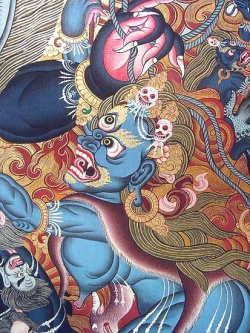Difference between revisions of "Yama"
(Created page with "thumb|250px| The god of death. (See, e.g., DhA.iii.337; Yamassa santikam = Maranasantikam). When beings die they are led before him to be judged ac...") |
|||
| Line 1: | Line 1: | ||
[[File:Yama-16349_2.jpg|thumb|250px|]] | [[File:Yama-16349_2.jpg|thumb|250px|]] | ||
| − | The | + | The [[God]] of [[Death]]. (See, e.g., DhA.iii.337; Yamassa santikam = Maranasantikam). |
| − | When beings die they are led before him to be judged according to their deeds. Birth, old age, illness, punishment for | + | When beings die they are led before him to be judged according to their deeds. Birth, old age, illness, punishment for [[Crime]] and [[Death]], are regarded as his messengers, sent among men as a warning to abstain from ill and do good. Yama questions beings brought before him as to whether they have seen these messengers and profited by them. If the answer is in the negative, the nirayapālas take them away to the different hells (M.iii.179ff). |
| − | In the | + | In the Mahā[[Samaya]] [[Sutta]] (D.ii.259) mention is made of two Yamas (duve Yamā), which the Commentary explains (DA.ii.690) by "dve Yamakadevatā" (the twins, whom Rhys Davids calls the Castor and Pollux of Indian Mythology, in Dial.ii.290, n.1). |
| − | Elsewhere (AA.i.374; MA.ii.953) Buddhaghosa speaks of four Yamas (im c' esa eko va hoti, catusu pana dvāresu cattāro janā honti) at the four gates (of the Nirayas?). He says that Yama is a Vemānikapetarājā, who sometimes enjoys all the pleasures of | + | Elsewhere (AA.i.374; MA.ii.953) [[Buddhaghosa]] speaks of four Yamas (im c' esa eko va hoti, catusu pana dvāresu cattāro janā honti) at the four gates (of the Nirayas?). He says that Yama is a Vemānikapetarājā, who sometimes enjoys all the pleasures of [[Heaven]], in a celestial mansion, surrounded by kapparukkhas, and at other times experiences the fruits of his [[Kamma]]. He is a good king. |
| − | In the Jātakas* the Nirayas are particularly mentioned as Yama's abode (Yamakkhaya, Yamanivesana, | + | In the [[Jātakas]]* the Nirayas are particularly mentioned as Yama's abode (Yamakkhaya, Yamanivesana, Yamasā[[Dana]], etc.); but, more generally, all [[Samsāra]] is considered as subject to Yama's rule, and escape from [[Samsāra]] means escape from Yama's influence, Yama being the [[God]] of [[Death]]. It is evidently in this sense that Yama is called Vesāyi (q.v.) (J.ii.317, 318). |
| − | Yama is sometimes mentioned** with Indra, Varuna, Soma, Pajāpati, etc., as a | + | Yama is sometimes mentioned** with Indra, Varuna, [[Soma]], Pajāpati, etc., as a [[God]] to whom sacrifices are offered. There is a tradition (A.i.142) that once Yama longed to be born as a human being and to sit at the feet of a [[Tathāgata]]. |
| − | Yama's Nayanāyudha is mentioned (SNA.i.225) among the most destructive of | + | Yama's Nayanāyudha is mentioned (SNA.i.225) among the most destructive of [[Weapons]]. |
{{R}} | {{R}} | ||
| Line 20: | Line 20: | ||
[[Category:Pali terminology]] | [[Category:Pali terminology]] | ||
[[Category:Buddhist Terms]] | [[Category:Buddhist Terms]] | ||
| − | [[Category: | + | [[Category:Yama]] |
Revision as of 06:13, 9 May 2013
The God of Death. (See, e.g., DhA.iii.337; Yamassa santikam = Maranasantikam).
When beings die they are led before him to be judged according to their deeds. Birth, old age, illness, punishment for Crime and Death, are regarded as his messengers, sent among men as a warning to abstain from ill and do good. Yama questions beings brought before him as to whether they have seen these messengers and profited by them. If the answer is in the negative, the nirayapālas take them away to the different hells (M.iii.179ff).
In the MahāSamaya Sutta (D.ii.259) mention is made of two Yamas (duve Yamā), which the Commentary explains (DA.ii.690) by "dve Yamakadevatā" (the twins, whom Rhys Davids calls the Castor and Pollux of Indian Mythology, in Dial.ii.290, n.1).
Elsewhere (AA.i.374; MA.ii.953) Buddhaghosa speaks of four Yamas (im c' esa eko va hoti, catusu pana dvāresu cattāro janā honti) at the four gates (of the Nirayas?). He says that Yama is a Vemānikapetarājā, who sometimes enjoys all the pleasures of Heaven, in a celestial mansion, surrounded by kapparukkhas, and at other times experiences the fruits of his Kamma. He is a good king.
In the Jātakas* the Nirayas are particularly mentioned as Yama's abode (Yamakkhaya, Yamanivesana, YamasāDana, etc.); but, more generally, all Samsāra is considered as subject to Yama's rule, and escape from Samsāra means escape from Yama's influence, Yama being the God of Death. It is evidently in this sense that Yama is called Vesāyi (q.v.) (J.ii.317, 318).
Yama is sometimes mentioned** with Indra, Varuna, Soma, Pajāpati, etc., as a God to whom sacrifices are offered. There is a tradition (A.i.142) that once Yama longed to be born as a human being and to sit at the feet of a Tathāgata.
Yama's Nayanāyudha is mentioned (SNA.i.225) among the most destructive of Weapons.
